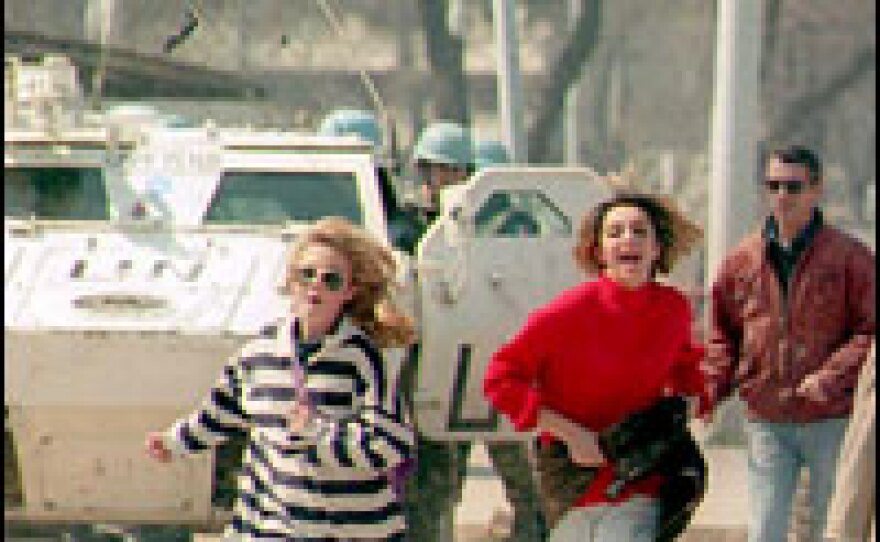

Radovan Karadzic's arrest on war crimes charges was met with a burst of celebration in the streets of Sarajevo. The city suffered a brutal siege at the hands of Bosnian Serb militias loyal to Karadzic during the Bosnian war in the 1990s.
But many citizens of Sarajevo are bitter that he was able to live on the lam for 13 years before he was detained.
In the headquarters office of a group known as The Mothers of Srebrenica, the walls are covered with snapshots of men and young boys, as well as many photographs of skulls and bones scattered on the ground. The group was created to track down and identify the remains of their loved ones slaughtered in Srebrenica in July 1995 by Bosnian Serb forces under the orders of Karadzic and military commander Ratko Mladic.
They say that of an estimated 8,000 killed, forensic experts have so far identified the remains of only 3,500.
Sabahta Fejzic, 52, has still not found the remains of her husband and son. Karadzic's capture has not lessened her pain.
'Such A Long Time'
"Concerning the arrest itself, I'm more indifferent than happy, I would say," Fejzic says. "It has been such a long time since all the atrocities have been committed and such a long time since he has been free. It's been 13 years, and in this period he was able to enjoy all the benefits this world can offer. They should have arrested him at least 10 years ago."
The remains of Zumra Shehomerovic's husband were identified only a few months ago. It was difficult, she says, because Karadzic's men threw the bodies into mass graves, then dug them up and scattered the bones in different places in an effort to cover up the massacre.
"While they were alive, they have been mistreated in unimaginable ways," she says. "Their hands were bound with wire, they were blindfolded, they were sexually abused, they were beaten. And after all these inhuman acts [were] carried out on them, and when they were finally killed, they were still not left alone — they were still harassed by their murderers."
Mirza Hajric, the former adviser to the late Bosnian President Alija Izetbegovic, says, "We all know it is too late, and we hope it won't be too little."
Concerns About The Tribunal
Hajric worries that once on trial in The Hague, Karadzic will use it as a platform for Serbian nationalism, emulating his onetime mentor Slobodan Milosevic, who died in detention without being convicted.
Hajric says that in order to regain the confidence of a skeptical public, the war crimes tribunal must set tight restrictions on defendants acting as their own lawyers and perhaps focus on only some of the charges in the indictment in order to speed up the proceedings, as was done in the case of former Iraqi President Saddam Hussein.
Three days after the arrest, most young people in Sarajevo seem more concerned with the problems of their daily lives. The jobless rate is 40 percent, and polls show 65 percent of young people want to leave the country.
Suad Slipicevic, 30, is one of the luckier ones and wants to stay. He works as a tax consultant and occasionally as an interpreter. He hopes Karadzic's arrest will open up young Serbs' eyes
"Had he not been arrested, I think he most definitely would remain a hero and become a mythical figure for Serbian youth," Slipicevic says.
Confronting A Painful Truth
Jakup Finci is also hopeful.
He's a Sarajevo institution. During the war, as a leader of the Jewish community, his humanitarian organization assisted all of Bosnia's ethnic groups without distinction. And he has played key roles in postwar Bosnia.
Finci says he hopes that Karadzic's arrest and trial will finally revive his proposal for a truth and reconciliation commission — an idea rejected by Bosnian politicians
"This mistrust between the political leadership stopped the whole process, because the name truth and reconciliation means that each truth will lead us toward reconciliation," Finci says. "Sometimes, truth is very painful. But without truth, justice cannot be made."
Today's Bosnia is the creation of international mediators. Its anthem still has no lyrics — no one can agree on them. Finci says that it's only through truth and reconciliation that this ethnically divided country can be finally reunited.
Copyright 2022 NPR. To see more, visit https://www.npr.org. 9(MDAzMjM2NDYzMDEyMzc1Njk5NjAxNzY3OQ001))






